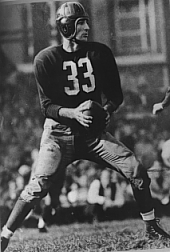"In contrast with the practice in major league baseball, the network-television bonanza is shared equally by all NFL teams."Hopefully we can lay this one to rest once and for all: As far as television revenue is concerned, the NFL and Major League Baseball have nearly identical systems. In both leagues, network money is divided evenly, while local TV money belongs to the individual teams and is not shared. The critical difference is that in the NFL, nearly all television income comes from network contracts, while in baseball, the vast majority of TV revenue is generated on the local level.
Each year, the NFL plays only 256 regular season games and 11 playoff games. Every one of them is on either a broadcast or cable network. (Those of us with the dish are able to watch all 267, provided we don't have jobs or family responsibilities.) Four networks (Fox, CBS, NBC and ESPN) pay the league $3.1 billion a year -- that's billion with a B -- for the rights to the games, and that revenue is split 32 ways. This is why the league has a salary cap of more than $100 million. Local TV revenue? Well, each team is free to make as much money as it can off telecasts of its desultory exhibition games. This is not a large hill of beans -- almost negligible, actually.
Major League Baseball, meanwhile, has contracts with only two networks. Fox pays $2.5 billion over six years; ESPN, $2.4 billion over eight. That money is split 30 ways, and amounts to about one-quarter the revenue per team that NFL franchises receive. Baseball plays 2,430 regular season games a year. The networks cover maybe 120 of them, plus the playoffs. Dish or no dish, you ain't seeing most of the others. The thousands of other games are covered by local TV. And that's the problem. The New York Yankees, in an enormous media market, can make 10 times or more what a small-market club like the Kansas City Royals can bring in. That's why baseball doesn't have -- really can't have -- a salary cap.
None of this is about defending baseball's counterproductive and self-destructive revenue system. Baseball teams could decide to share local TV money the same way they split network money. They just don't.


No comments:
Post a Comment